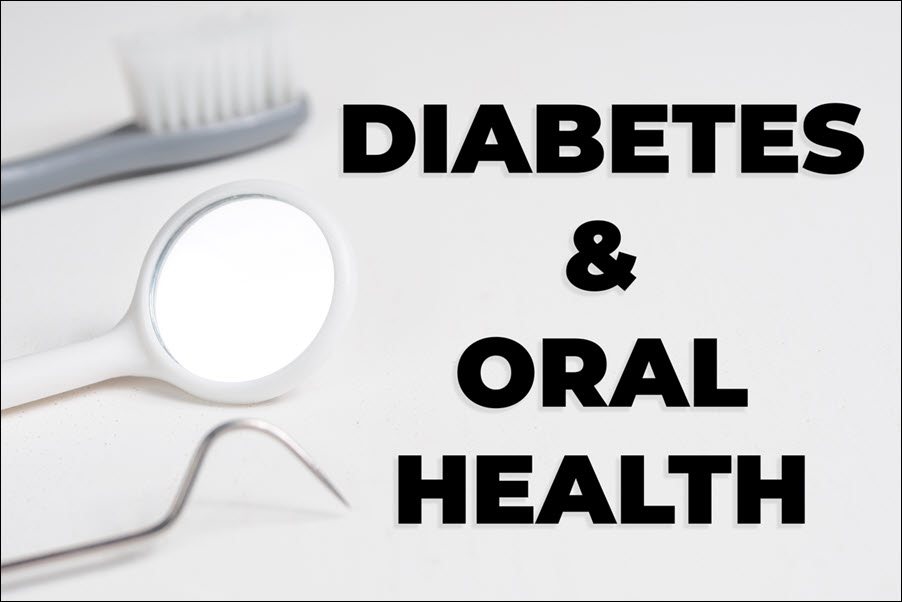Diabetes affects dental health and increases the risk of gum disease and tooth decay. High blood sugar levels weaken the immune system, increasing the chance of infection. Poor blood circulation reduces gum healing and increases sensitivity. Professional dental care reduces plaque buildup and strengthens enamel. Dentists monitor gum health and recommend treatments to reduce inflammation. Regular cleanings remove tartar and improve gum strength. Early detection prevents serious complications and tooth loss. Proper oral hygiene increases resistance to bacterial infections. Understanding how diabetes affects dental health improves treatment success. Let’s explore key dental considerations for diabetic patients.
Increased Risk of Gum Disease
 High blood sugar increases plaque buildup and gum inflammation. Plaque irritates gums, causing swelling and sensitivity. Diabetic patients develop gum disease faster due to weakened immune response. Gingivitis causes red, swollen gums that bleed during brushing. Untreated gingivitis leads to periodontitis, which damages gum tissue and bone. Professional cleanings reduce plaque and tartar, improving gum health. Dentists recommend brushing twice daily with fluoride toothpaste. Flossing daily removes plaque from between teeth and under the gumline. Antibacterial mouthwash reduces plaque and strengthens gum attachment. Professional monitoring increases gum strength and reduces inflammation. Reduced gum irritation increases chewing comfort and bite stability. Proper care prevents gum disease and improves long-term dental health.
High blood sugar increases plaque buildup and gum inflammation. Plaque irritates gums, causing swelling and sensitivity. Diabetic patients develop gum disease faster due to weakened immune response. Gingivitis causes red, swollen gums that bleed during brushing. Untreated gingivitis leads to periodontitis, which damages gum tissue and bone. Professional cleanings reduce plaque and tartar, improving gum health. Dentists recommend brushing twice daily with fluoride toothpaste. Flossing daily removes plaque from between teeth and under the gumline. Antibacterial mouthwash reduces plaque and strengthens gum attachment. Professional monitoring increases gum strength and reduces inflammation. Reduced gum irritation increases chewing comfort and bite stability. Proper care prevents gum disease and improves long-term dental health.
Delayed Healing After Dental Procedures
Diabetes slows healing due to poor blood circulation. Reduced blood flow weakens tissue repair and increases infection risk. Professional care increases healing success and reduces complications. Dentists recommend pre-procedure glucose control to improve recovery. Antibiotic treatments reduce infection risk and improve healing speed. Professional fluoride treatments strengthen enamel and increase tissue strength. Reduced inflammation improves gum attachment and healing response. Stronger gums increase tooth stability and reduce sensitivity. Professional monitoring ensures proper recovery and bite alignment. Early intervention prevents complications and increases recovery speed. Stronger gum attachment improves overall dental strength. Professional care increases healing success and reduces discomfort.
Increased Risk of Dry Mouth
High blood sugar reduces saliva production and increases dry mouth. Saliva protects enamel and reduces plaque buildup. Reduced saliva increases cavity and gum disease risk. Drinking water throughout the day improves saliva flow and mouth moisture. Dentists recommend sugar-free gum and lozenges to stimulate saliva production. Rinsing with mouthwash increases moisture and reduces bacterial growth. Professional fluoride treatments strengthen enamel and reduce sensitivity. Regular cleanings remove plaque and improve saliva flow. Professional care increases mouth moisture and chewing comfort. Reduced dry mouth increases plaque resistance and gum health. Increased saliva flow improves speech clarity and mouth comfort. Proper hydration increases overall dental strength and comfort.
Higher Cavity Risk from High Blood Sugar
 High blood sugar feeds bacteria that produce cavity-causing acids. Acid weakens enamel and increases sensitivity. Professional cleanings remove plaque and reduce acid buildup. Fluoride treatments strengthen enamel and reduce cavity formation. Dentists recommend using fluoride toothpaste to improve enamel strength. Proper brushing and flossing reduce plaque and bacterial growth. Professional care increases cavity resistance and enamel durability. Balanced blood sugar levels reduce acid exposure and increase enamel strength. Professional monitoring detects early signs of decay and prevents cavities. Stronger enamel increases chewing comfort and reduces sensitivity. Reduced plaque increases bite strength and gum health. Professional care increases long-term cavity resistance and dental strength.
High blood sugar feeds bacteria that produce cavity-causing acids. Acid weakens enamel and increases sensitivity. Professional cleanings remove plaque and reduce acid buildup. Fluoride treatments strengthen enamel and reduce cavity formation. Dentists recommend using fluoride toothpaste to improve enamel strength. Proper brushing and flossing reduce plaque and bacterial growth. Professional care increases cavity resistance and enamel durability. Balanced blood sugar levels reduce acid exposure and increase enamel strength. Professional monitoring detects early signs of decay and prevents cavities. Stronger enamel increases chewing comfort and reduces sensitivity. Reduced plaque increases bite strength and gum health. Professional care increases long-term cavity resistance and dental strength.
Importance of Professional Cleanings and Checkups
Professional cleanings prevent plaque buildup and reduce gum inflammation. Dentists recommend cleanings every three to six months for diabetic patients. Cleanings remove plaque from hard-to-reach areas and strengthen enamel. Professional fluoride treatments improve enamel strength and cavity resistance. Dentists monitor gum health and recommend treatments to reduce sensitivity. Professional care increases gum strength and attachment. Reduced plaque improves breath freshness and chewing comfort. Stronger gums increase tooth stability and bite strength. Early detection prevents gum disease and tooth loss. Professional monitoring increases overall dental strength and health. Stronger enamel increases chewing comfort and bite consistency. Regular dental care improves long-term gum and tooth health.
Managing Blood Sugar for Better Dental Health
Balanced blood sugar improves gum health and reduces plaque buildup. High blood sugar increases inflammation and weakens gum attachment with diabetes. Professional care improves gum strength and surface protection. Dentists recommend monitoring blood sugar levels before dental procedures. Reduced inflammation increases gum attachment and healing speed. Stronger gum tissue increases tooth stability and chewing comfort. Professional fluoride treatments increase enamel strength and surface durability. Reduced plaque buildup improves breath freshness and mouth comfort. Early intervention prevents complications and increases recovery speed. Professional care increases long-term gum and tooth health. Proper blood sugar control improves overall dental strength and comfort.
Boosting Confidence with a Healthy Smile
Stronger teeth and gums increase smile strength and confidence. Proper blood sugar control improves gum strength and bite balance. Professional care increases enamel durability and surface protection. Reduced plaque buildup increases breath freshness and mouth comfort. Professional cleanings improve tooth color and surface smoothness. Balanced gumlines increase smile symmetry and facial balance. Stronger enamel increases chewing efficiency and bite comfort. Professional fluoride treatments increase cavity resistance and gum health. Clean, smooth teeth improve overall smile strength and appearance. Balanced blood sugar increases gum strength and healing response. Professional care increases smile strength and consistency. A healthy smile improves personal and social confidence.
Importance of Early Intervention with Diabetes
Early treatment prevents serious dental complications. Professional exams detect early signs of gum disease and decay. Early intervention reduces plaque buildup and increases enamel strength. Professional fluoride treatments increase cavity resistance and sensitivity protection. Reduced inflammation improves gum attachment and healing response. Professional care improves tooth strength and surface durability. Balanced blood sugar reduces plaque formation and gum irritation. Professional cleanings increase gum strength and tooth stability. Early detection increases treatment success and reduces discomfort. Professional monitoring improves long-term gum and tooth health. Proper care increases chewing comfort and bite strength. Early intervention increases overall dental strength and comfort.
Diabetes increases gum disease and tooth decay risk. Professional cleanings reduce plaque and improve gum strength. Balanced blood sugar improves enamel strength and gum health. Professional fluoride treatments increase cavity resistance and sensitivity protection. Early detection prevents gum disease and increases tooth stability. Reduced plaque improves breath freshness and bite comfort. Stronger enamel increases chewing efficiency and bite strength. Professional care improves healing success and gum attachment. Proper hydration increases saliva flow and enamel strength. Investing in dental care increases long-term smile strength and health. Professional monitoring improves gum health and overall dental strength.





